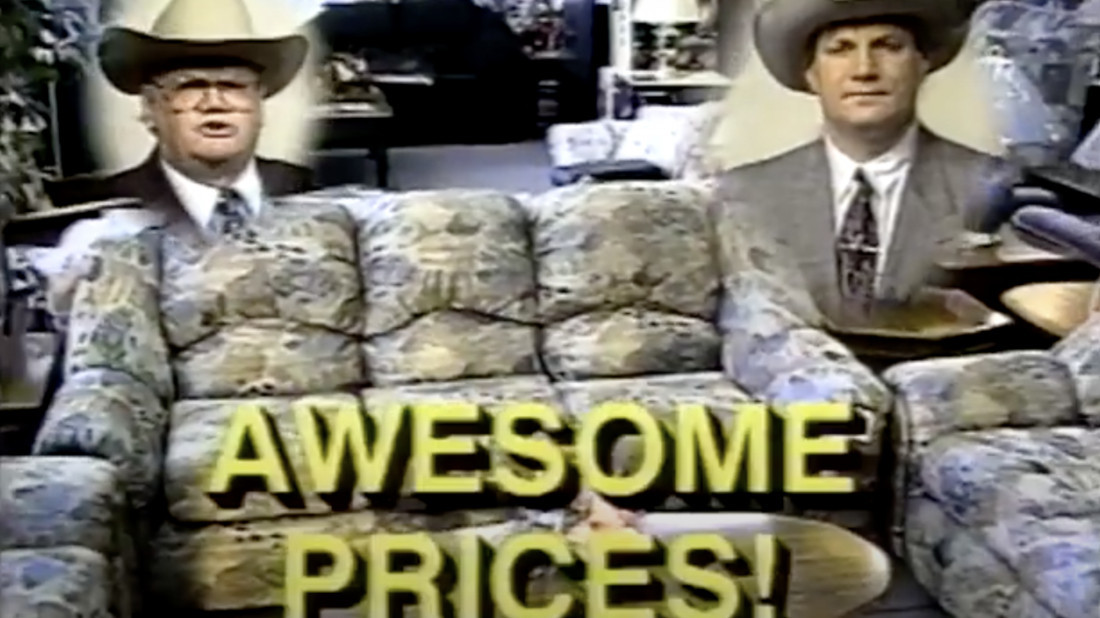Kern-Hill Furniture stands the test of time
U of W Archives digitize the furniture store’s classic commercials
While students may not remember the glory days of local commercials, many Winnipeggers can’t forget Kern-Hill Furniture’s high-energy TV advertisements. The University of Winnipeg Archives recently digitized Kern-Hill’s locally famous commercials, which are now available online.
The ads feature Kern-Hill owner Nick Hill, who ran the business from 1957 until his death in 2003, donning his signature cowboy hat and rhythmically chanting like an auctioneer. He shares the screen with his “No. 1 son,” Andrew, who modulates his father’s rapid claims with a more passive delivery style.
“Kern-Hill has an iconic place in Winnipeg’s business history,” Thomas Nesmith says in an email to The Uniter. Nesmith is professor emeritus at the University of Manitoba’s archival-studies department. He notes the similarities between The Price is Right and Kern-Hill’s commercials.
The “game-show announcer always called audience contestants to the stage with ‘come on down’ to try to win merchandise not unlike what Kern Hill (was) selling. Making the business of selling a kind of game show may have helped Kern Hill a lot,” Nesmith says.
He adds that Winnipeg’s business history, including Kern-Hill’s legacy, should be better known. “There is much more to know about these fascinating entrepreneurs and the less flashy ones who also shaped our city life,” Nesmith says.
Brett Lougheed is a digital curator at the U of W Archives. He says the archives are reaching out to the Hill family about acquiring records to further illustrate the furniture store’s local impact.
The archives received the commercials on analog video cassettes. Lougheed says archival preservation is expensive. To convert these cassettes to more modern, accessible formats, they shipped the original commercials to a vendor in Toronto. There is also an ongoing cost to store the converted digital information.
“Digitization is a complex and costly task,” Nesmith says. “It’s not simply a matter of pressing a camera button.”
However, this cost is often worth it to preserve history when possible. Lougheed says digitization can help more people access important archival materials.
“Archives reflect society. They provide documented evidence of activities undertaken by individuals around the world,” he says.
“If there were additional funding resources available to us, archives might be able to digitize more content to make more content accessible to people online and ensure that important documentary heritage is preserved for the long term.”
Nesmith says it’s not possible to digitize all archived materials, as “the holdings of archives are so massive, in most cases, or continually growing.” However, he says the classic Kern-Hill commercials are among local stories “needing to be archived before they are lost forever.”
Lougheed agrees. “If we don’t (archive certain historic materials), it’s possible that records of importance to society will be lost forever,” he says.
The U of W Archives received a grant from the provincial Department of Culture, Heritage, and Sport to digitize the videos. Andrew Burke, an associate professor of cultural studies at the U of W specializing in film and television, also received funding from the U of W to assist the digitization process.
To watch these kitschy gems of local history, visit the University of Winnipeg Archives’ YouTube channel.
Published in Volume 77, Number 22 of The Uniter (March 16, 2023)








